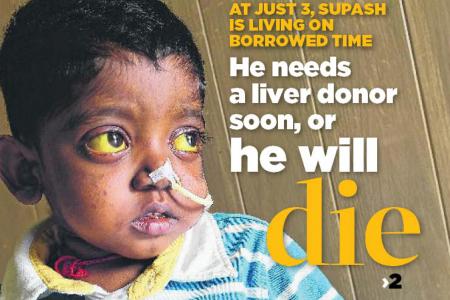Hope for boy, 3, dying of liver disease as TNP readers respond
It was the first time in three years his wife has smiled.
Mr V. Senthilkumar said he and his wife have been worried sick since their son was born three years ago.
Their boy, Supash, has been suffering from biliary atresia, a type of chronic liver disease, since birth.
Most children with his condition do not make it past their third birthday unless they get a transplant.
Supash's parents know that time is running out and have been actively searching for a donor.
But neither of them nor their 20 family members, including Supash's older sister, yielded a positive match.
Last Friday, The New Paper published the couple's appeal to save their son's life and since then, they have received calls, messages and e-mails from people who came forward to offer to donate their livers.
Mr Senthilkumar, 44, a warehouse assistant, said he had received more than 100 calls and texts from readers offering to help.
One of the callers, Mr Murugesh, said he cried when he first phoned Mr Senthilkumar.
He said: "This is just a boy, a baby. I read the story in TNP and I can feel him suffering. I couldn't take it. I don't need anything from (the family) in return. I just want to help the boy."
Said Mr Senthilkumar, who admitted he also broke down during that conversation: "I am very touched. I am very grateful. I didn't expect this amount of support from the public. No words can express how happy this has made us."
He added: "My wife, she's not stopped crying every night since we found out about Supash's condition. Now, this is the first time in three years she's started smiling again."
Supash has dark-yellow eyes and a bloated tummy due to jaundice and the build-up of fluids in his abdomen - common symptoms of biliary atresia.
He is also suffering from arthritis and has a feeding tube inserted down into his stomach because he does not like to chew food, said the father.
The boy's mother, Ms Supashini, 33, an administrative assistant, has taken two months' leave from work to care for her son at their three-room flat in Bukit Batok.
The boy's grandmother will look after Supash when Ms Supashini returns to work.
The toddler also requires monthly check-ups at the National University Hospital (NUH), where doctors administer medicine to drain the fluids from his swollen stomach, said the father.
HAPPIER
When TNP visited Supash at his NUH ward last Friday, he looked livelier and more cheerful than when we met him last Wednesday.
He would squeal in laughter when medical staff checked and massaged his stomach.
But the couple admitted that the battle to save their son's life is far from over.
Said Mr Senthilkumar: "There are still many tests to be done to decide if each person is suitable to be a donor, and that takes a while.
"But NUH has been very helpful and good in caring for our child. Supash always looks forward to coming to the hospital."
He added that he is sure his son will pull through.
"With all this help, I know, I just know, we will find a donor and my son will survive," he said.
If your blood type is O positive and you want to help, please call Mr Senthilkumar at 9678-4445.
WANT TO BE AN ORGAN DONOR?
Professor K.K. Madhavan, the co-director of the National University Centre for Organ Transplantation, said potential donors must be healthy with no illness and history of medication.
They need to be of the same blood group or a compatible blood group with the recipient and have to undergo tests such as blood tests, X-rays and CT scans to assess their suitability.
Those found to be suitable will be further assessed by a National Transplant Ethics Committee, which will decide if a transplant can take place.
WHAT IS BILIARY ATRESIA?
Biliary atresia is a life-threatening condition in infants in which the bile ducts, which carry bile from the liver to the gall bladder, do not work properly.
With biliary atresia, bile becomes trapped, builds up and damages the liver.
Without treatment, the liver eventually fails and the infant needs a liver transplant to survive.
Supash's doctor, Associate Professor Marion Aw, a senior consultant at National University Hospital's division of paediatric gastroenterology, hepatology and nutrition, said the boy's condition is serious.
Most children with this condition have a 90 per cent chance of dying by their second or third birthday, Prof Aw added.
Get The New Paper on your phone with the free TNP app. Download from the Apple App Store or Google Play Store now




